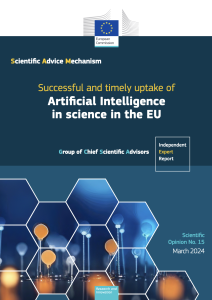
The EU must provide a competitive and attractive AI research environment by offering the opportunity to work on high-impact societal challenges and a stimulating work environment, in addition to a high quality of life.
These are some of the topics explored in the new SAM Evidence Review Report.
Artificial intelligence has the potential to revolutionise scientific discovery, accelerate research progress, boost innovation, and improve researchers’ productivity. The EU must take hold of the opportunities this brings, and in a timely way. This is among the conclusions in a new evidence review report from the Science Advice Mechanism to the European Commission.
The new Evidence Review Report, a Scoping Paper and a Scientific Opinion on the topic “Successful and timely uptake of artificial intelligence in science in the EU” is now available to download from the SAM website.
The Academia Europaea hub in Cardiff will organize a webinar on the topic “AI and academic publishing: What does the future hold for authors, readers and publishers?” on 13th May. Several people connected with the recent Evidence Review Report will be panelists, including the Chair of the Group of Chief Scientific Advisors, Professor Nicole Grobert.

The EU should prioritise AI-powered research in areas where large amounts of data are available but difficult to interpret, such as personalised health, social cohesion, and the green and digital transitions. This will bring the greatest benefits for EU citizens.
It is important to support new research into the greenest AI algorithms and infrastructure, to help manage the environmental impact of the technology.
AI-powered scientific research requires a vast amount of data. That data should be high quality, responsibly collected and well curated, with fair access for European researchers and innovators. So the EU should continue to work with the research community to ensure that data standards, guidelines and best practices can evolve as technology develops.
A geopolitical asset
AI has become a geopolitical asset. The availability of both human talent and computing power defines which parts of the world can make the most of AI, and which are falling behind. Currently, most AI infrastructure belongs to a small number of companies, largely in the US and China, and even public research labs depend on them for computing power. The opacity of the commercial AI sector makes it difficult to obtain the transparent, reproducible scientific results that are essential to robust science in an open society.
To rebalance the situation and boost public research across all disciplines and member states, we need to give universities and research institutes across Europe fair access to state-of-the-art AI facilities. A new European institute for AI in science would provide massive high-performing computational power, a sustainable cloud infrastructure, and AI training programmes for scientists. Alongside these services, a European AI in Science Council would provide dedicated funding for researchers in all disciplines to explore and adopt AI in their sciences. These would also ensure that AI in research aligns with EU core values.
The EU must provide a competitive and attractive AI research environment by offering the opportunity to work on high-impact societal challenges and a stimulating work environment, in addition to a high quality of life.
These are some of the topics explored in the new Evidence Review Report. The review document, a Scoping Paper and a Scientific Opinion, as well as an introduction video, is available from the SAM website.
